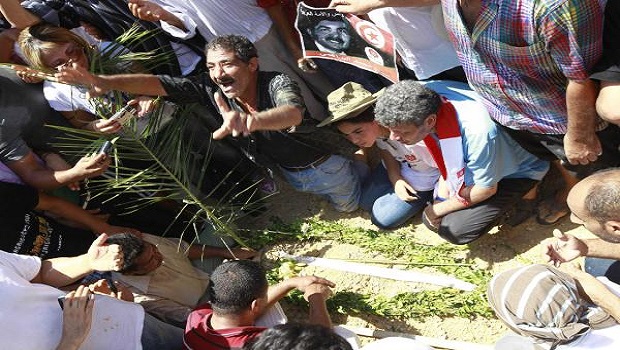
Mourners attend the funeral of slain opposition leader Mohamed Brahmi, at the cemetery of El-Jellaz in Tunis July 27, 2013. REUTERS/Anis Mili
Security sources have estimated the number of people in attendance at the funeral, which was shown live on TV, to be more than 50,000.
Brahmi’s family said they held the government responsible for the second political assassination in six months. Another leading opposition figure, Chokri Belaid, was assassinated in February outside his house in the capital, Tunis.
Police announced they arrested a Salafist man in conjunction with the alleged murder, though others remain at large
People at the funeral carried signs showing anti-government slogans and shouted, “Disobedience until the fall of the Muslim Brotherhood” and “The people want to topple the regime.”
In a speech at the funeral, Brahmi’s widow, Mbarka Aouainieh, urged people to “occupy the streets and continue the struggle on martyr Brahmi’s path until the government and the Constituent Assembly are dissolved.”
Clashes erupted after the funeral between supporters of the government and the group calling for civil disobedience. The clashes reached the area around the Constituent Assembly, where protesters clashed with security forces, who used tear gas to disperse the crowd.
The Salafist jihadist Ansar Al-Shari’a organization issued a statement on Saturday calling on supporters to distance themselves from the conflict between the Ennahda government on the one hand, and the opposition and Tamarod (Rebellion) movement on the other. In the statement, the organization told Ennahda that “there will be no unity except on the word of God, and the implementation of God’s law in Tunisia.”
The opposition Popular Front, led by Hamma El-Hammami, condemned what it called the “brutal repression” of demonstrators in Gafsa, Sfax and El-Kef during demonstrations in protests against the murder of Brahmi. Mohamed Mufti, member of the regional coordination committee of the party in Gafsa, was killed when he was struck by a tear gas canister fired by police.
In the meantime, Ennahda party leader Rachid Ghannouchi denied his movement had accepted the establishment of a national salvation government without dissolving the Constituent Assembly in a statement to the official Tunisian News Agency (TAP).
In a statement to Express FM, the government general coordinator, Noureddine Buhairi, accused internal and external parties of “working to spread confusion and chaos, and to disrupt the democratic process in Tunisia.” He added: “Every time we make progress in making the revolution succeed, some parties rush to cause confusion.”
